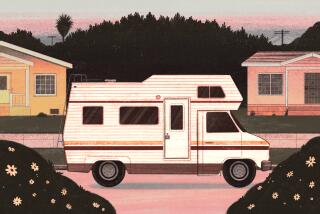Baby Boomers Crowd Onto the RV Trail
- Share via
BRUNSWICK, Maine — Marc LaPierre spared no comfort when he chose his home-on-the-road: His RV is outfitted with a central vacuum.
“There’s nothing in there that I don’t have at home,” said LaPierre, 59, who so likes his king-size bed that he sometimes finds himself sleeping in it even when he and his wife stay at their lakeside home in Quebec.
The older generation aside, baby boomers helped push recreational vehicle sales to a 21-year high last year. And sales are on track to surpass last year’s figures despite this summer’s high gasoline prices.
Like the stream of big rigs that rolled into Brunswick one August weekend, there seems to be no end in sight, industry officials say.
Baby boomers are finding they can hit the road with all the amenities of home, including washers and dryers, tile and hardwood floors and stereo surround sound. And gas prices do not appear to be a big concern.
“It just boggles my mind to see so much money out there,” said Diane Doyle, 53, of Westford, Mass., who worked her way into a top-of-the-line $300,000 motor home 10 years after getting started with a pop-up trailer in 1980.
Some well-heeled vagabonds have sold their conventional homes and live in their RVs year-round, traveling wherever the spirit moves them and picking up mail at various drops along their route.
Nationwide, the average age of RV owners has dropped to 48 while ownership has climbed to an all-time high at 9.5 million, according to the Recreation Vehicle Industry Assn., based in Reston, Va.
About 1 million of the RVs belong to so-called “full timers,” hundreds of whom traveled to the Brunswick Naval Air Station for the 37th Family Motor Coach Assn. convention.
The event was so big that the Navy base closed its runways, sent its planes to Bangor and allowed 7,422 motor homes to move in. Altogether, 20,000 people attended the convention, and the total number of coaches reached an all-time high, said Robbin Gould, editor of Family Motor Coaching, the official magazine of the Family Motor Coach Assn.
Nearly all of the RVs rolling down the highways had minivans or sport utility vehicles in tow, looking like the on-land version of yachts pulling dinghies.
These land yachts, like their waterborne counterparts, were far from spartan. They came equipped with such amenities as full-size refrigerators and dishwashers, VCRs and televisions.
Marc Darby, 63, a retired risk manager from St. Lambert, Quebec, had a full-size gas grill stowed in the belly of his 37-foot rig. He also has a laptop computer and satellite dish, and his wife keeps a bread maker.
Basic equipment in most RVs includes roof-mounted air conditioners, generators and water reservoirs large enough to last days without the need to take on water.
The most expensive units, which can cost upward of $1 million apiece, have marble floors and leather furniture. One of the demo models even had a flat-screen television that drops from the ceiling at the push of a button.
The latest feature is slide-out walls--activated with the flip of a switch--that make rooms even larger.
Sales of RVs, including travel trailers, camper trailers, truck campers and motor homes, were up 10% last year, and the total value jumped 24.6%, an increase driven by the greater level of amenities demanded by customers, said Jeff Beddow, spokesman for the Recreation Vehicle Industry Assn.
So far this year, motor home sales have dropped 5% from last year’s pace, but the RV industry overall was up 2.3% through June thanks to strong demand for units that can be towed, he said.
Interest rates may have had an impact on sales of expensive motor homes, but gas prices generally do not impact sales, Beddow said. The largest motorized RVs can hold upward of 150 gallons, meaning it would cost several hundred dollars to fill--with either gas or diesel.
Those with a hankering to hit the road, it seems, will not let the added expense keep them from rolling down the highway. But Dennis MacKenzie, 54, of Sarnia, Ontario, says there can be a few bumps in the road.
It’s inevitable that motor homes break down, and they usually do so in a remote place on a Friday afternoon, he said. And for those who do it full time, the scenery that attracts people can become ho-hum.
It may sound like heresy to a motor home enthusiast, but MacKenzie and his wife admit that they got bored after several years of being full-time road warriors. “How many times can you see the same sights?” he said.
Of course, it’s a big enough country that some never get bored. And there are advantages to seeing it by motor home.
For example, there are no worries about getting stuck at an airport because of a canceled flight. And there are no worries about hotel reservations. Just park and you’re ready to bed down.
Best of all, there’s no need for luggage.
“There’s no packing or unpacking,” Darby said.
*
On the Net:
Recreation Vehicle Industry Assn.:
https://www.rvia.com
More to Read
Sign up for The Wild
We’ll help you find the best places to hike, bike and run, as well as the perfect silent spots for meditation and yoga.
You may occasionally receive promotional content from the Los Angeles Times.






